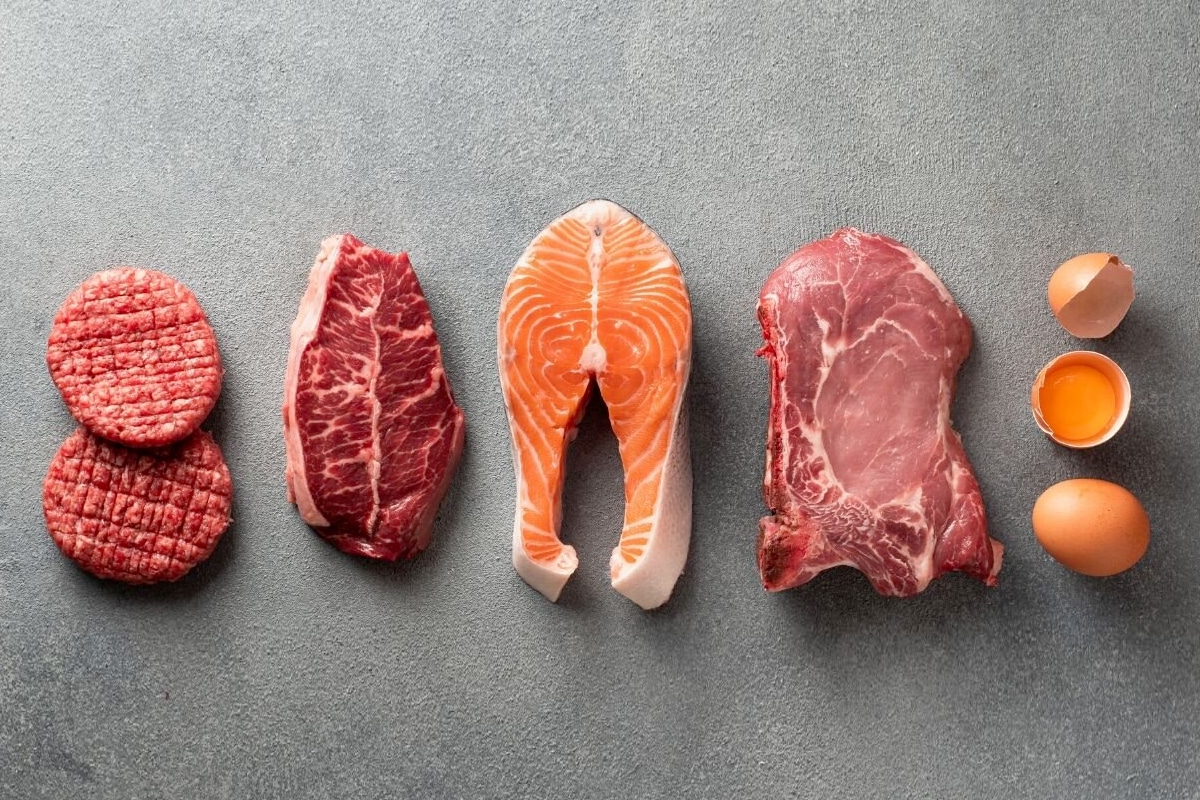
Published:
Readtime: 8 min
Every product is carefully selected by our editors and experts. If you buy from a link, we may earn a commission. Learn more. For more information on how we test products, click here.
The Carnivore Diet has exploded in recent years, thanks largely to it receiving the ‘Joe Rogan stamp of approval’. Behind the movement are medical doctors like Shawn Baker and Paul Saladino, both of whom have written books on the diet and profess the incredible effects it has had on their own health and thousands of their followers. But with other health professionals telling us to limit our red meat intake or even stamp it out altogether, can a meat-only diet actually be good for you? Could animal-based eating be the key to good health that our ever-worsening public health has been lacking?

What is the Carnivore Diet?
A carnivore diet is, as the name implies, a diet that consists entirely of animal-based foods. Animal-based foods include meat, eggs, fish, and certain dairy products, and exclude all other foods – fruit, vegetables, grains, and nuts. Normally, an individual subscribing to the diet will eat 1-3 meals per day within a 6-10 hour window to also incorporate the benefits of intermittent fasting. Similar to the high-fat, low-carb Ketogenic diet, the Carnivore Diet takes this one step further by excluding carbohydrates altogether and only incorporating animal fats.
This way of eating stems from the idea that our primate ancestors evolved thanks to their increased meat consumption, and that high-carb diets are to blame for the abundance of chronic disease in today’s society. One key argument for the diet is that throughout recorded history, there are numerous examples of cultures and tribes that only ate meat yet lived remarkably healthy lives. These tribes include the Inuit of the Canadian Arctic, who thrived on fish, seal, walrus, and whale meat, and the Maasai tribes of Eastern Africa, who consumed meat, milk, and blood. Even our physical evolution points to the importance of meat-eating, with evidence showing our digestive system is more similar to carnivorous animals than to other plant-eating species.
While conventional nutritional guidance suggests that red meat and processed meat is detrimental to our health when eaten in large amounts, Carnivore Diet experts refute this claim. Instead, they insist that eating meat brings immense and proven benefits for our health.
Carnivore Diet Meal Plan
Your primary focus on this diet should be fatty cuts of meat like beef. Here is a list of the foods generally accepted on the Carnivore Diet:
Foods
- Beef Cuts (Steaks, roasts, ground beef, organ meat)
- Lamb
- Pork
- Poultry
- Fish
Beverages
- Water
- Bone Broth
Condiments
- Salt & Pepper
- No carb spices
Example Carnivore Diet Plan
Breakfast (10am)
- 4 eggs
- 4 pieces of natural bacon
- Bone broth
Lunch (2pm)
- 2 beef burger patties (200g each)
- 2 servings of hard cheese
Dinner (6pm)
- 500g scotch fillet steak
Benefits of the Carnivore Diet
The purported benefits of the Carnivore diet are eye-opening, to say the least. People who have taken on the diet (this writer included) have reported incredible short and long term benefits after making the switch to an animal-based diet. And while your doctor may cringe at you eating only meat, the anecdotal and researched benefits may outweigh the awkward conversations. These benefits include:
Weight Loss
Now I know what you’re thinking, eating fatty meats all day is a sure-fire way to get fat. In reality, that’s highly unlikely. You see, without carbs in your diet you don’t get the blood sugar spikes you would otherwise get. Without these insulin spikes, your body doesn’t receive the trigger to store incoming calories as body fat.
Furthermore, you would need to eat A LOT of meat to put yourself into a caloric surplus. Plus, protein and fats are very satiating, meaning they keep you feeling full for longer. helping to maintain a caloric deficit. Putting all of this together, and weight loss is a certainty on the Carnivore Diet.
Curing Illness
Many who take on the Carnivore Diet do so in an attempt to cure a chronic illness. While many of these accounts are anecdotal, dieters have reported being cured of auto-immune diseases, Chrone’s disease, depression, chronic inflammation, diabetes, IBS, and heart disease. It is important to note that these are just accounts from people on the diet, and more scientific analysis and study is needed to back up any of these claims.
Boosted Energy Levels
One of the most remarkable benefits experienced on the Carnivore Diet was the serious energy boost you receive. On a normal, relatively healthy Australian diet, we’d be reaching for a cup of coffee in the morning to wake us up and in the afternoon at work to keep us awake. A week into the carnivore diet, however, and our need for coffee completely vanished. As it turns out, this relates back to the former point. Without the blood sugar spikes throughout the day, you don’t experience the subsequent crashes and my body entered ketosis, burning fat as an energy source instead of carbs.
Better Heart Health
Regardless of what ‘experts’ may tell you, there is still no direct link between saturated fats and heart disease. In fact, the Maasai tribes of Eastern Africa consume more than 65% of their calories from saturated fat, yet heart disease is virtually non-existent in their communities.
Studies have backed up this concept, with a 2013 study finding that high fat, low carb diets may be more beneficial to cardiovascular health and inflammation reduction than low fat, high carb diets (like the vegan diet).
Higher Testosterone
There’s a reason why strength athletes live on meat – it massively boosts your testosterone levels, the hormone that drives muscle growth, libido, and fat distribution. In fact, one study found that a high fat, low carb diet like the Carnivore Diet boosted testosterone levels in participants 13 per centmore than their low fat, high fibre dieting counterparts.
Mental Clarity
Once past the initial adjustment period, where your body is figuring out what to use for energy instead of carbs, carnivore dieters report thinking more clearly and the ability to focus better.
Simplicity
At its core, the Carnivore diet is meat and water. No more figuring out intricate recipes and forgetting key ingredients, just add some spice to your meat, and away you go.

Downsides of the Diet
As with any diet, there are downsides to this way of eating. These downsides include:
The Adaption Period
With such a radical diet change, it will take your body time to adjust. During the adaption period, you may experience symptoms like fatigue, bad breath, immense cravings (sugar!), muscle soreness, diarrhea, decreased performance, and insomnia. The adaption period can take days or even weeks, and you may experience withdrawal symptoms from things your body has become addicted to – which is mainly sugar.
It’s Difficult to Maintain
It may sound fun at first, but just eating meat can get boring very fast. It’s even harder when everyone around you is consuming carb-filled goods and the sugar cravings kick in.
You May Miss Important Nutrients
Following any restrictive diet opens the doorway for malnutrition. When excluding plant foods and vegetables, you exclude foods that are rich in vitamins and nutrients and this can lead to deficiencies.
Scientific Backing is Scarce
Very little scientific research has been done on the long-term effects of eating meat. While the few studies completed do look very promising, more studies are needed to objectively evaluate the short and long-term effects of the diet.
May Not be Suitable for Some Populations
This high protein, high fat diet may not be suitable for everyone. People with certain pre-existing conditions, like people with chronic kidney disease who need to limit their protein intake, should not follow this diet.
Environmental Impact
If the whole world decided to just eat animals, that’d be a problem. Not only would we send several species extinct, but it would leave a terrible environmental impact.
When choosing to take on The Carnivore diet, it’s important to research and support organic, regenerative farming practices. Factoring farming is horrible, not only for the planet but for the animal welfare as well. Look for words like free-range and grass-fed, and buy local if possible.
Carnivore Diet FAQs
A carnivore diet is a diet that consists entirely of animal-based foods. Animal-based foods include meat, eggs, fish, and certain dairy products, and exclude all other foods – fruit, vegetables, grains and nuts.
Scientifically speaking, no. But while proponents of the Carnivore Diet report remarkable benefits to their health, the diet is extremely restrictive and likely unhealthy in the long term.






























Comments
We love hearing from you. or to leave a comment.